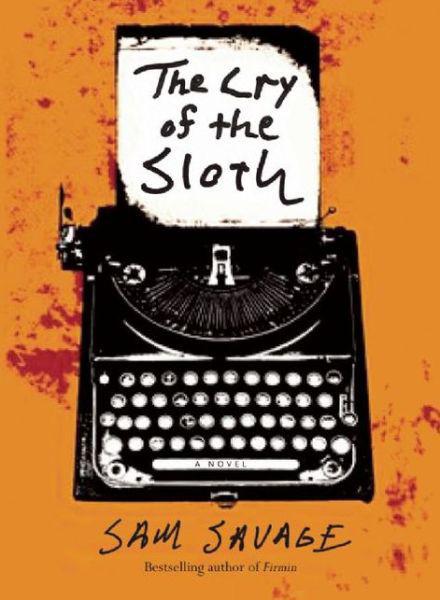
The Cry of the Sloth
کتاب های مرتبط
- اطلاعات
- نقد و بررسی
- دیدگاه کاربران
نقد و بررسی

Starred review from June 15, 2009
Middle-aged underachiever Andy Whittaker plots a preposterous literary festival in this scathingly funny epistolary pastiche from Firmin
author Savage. Andy is the editor of Soap
, an inconsequential literary magazine ridiculed by rival The Art News
, which Andy dismisses as “the in-house journal for a tiny clique of very conventional, very middle-class writers and painters.” His wife, Jolie, has left him, his mother is dying and the apartment buildings inherited from his father are crumbling. Fern Moss, a precocious poetess, taunts Andy with provocative poems and photos, while Dahlberg Stint, a hardware store employee and former Soap
contributor, sends increasingly sinister threats. After his phone is shut off, a beleaguered Andy hunkers down to compose plaintive letters to Jolie, excuses for not visiting his mother, dismissive replies to Soap
hopefuls, snide notes to his tenants, pitiful missives to a former one-night-stand, fake letters to the editor and “prose poems, little existential parables of tedium and despair, set in Africa probably.” Andy's self-aggrandizing and self-pitying grow more desperate as Savage expertly skewers Andy's comically insufferable exterior to reveal the tragic if insubstantial soul of a frustrated writer.

Starred review from September 15, 2009
Four months in the life of a desperate, depressed and sexually frustrated landlord.
Andrew Whittaker blames"low-quality tenants" for the disrepair of his buildings in the Midwestern town of Rapid Falls. He has a somewhat better relationship with estranged wife Jolie, even though she left him to pursue an (unsuccessful) acting career in New York City. Letters to Jolie and a variety of significant others chronicle the declining fortunes of Andy's real-estate holdings and of Soap: A Journal of the Arts, the literary publication he founded and edits. Savage (Firmin: Adventures of a Metropolitan Lowlife, 2006) intersperses as well grocery lists, rental ads ("BIG AND COZY!"), rejection form letters and fragments of what Andy describes as"an odd little something which I suppose we'll have to call a novel," whose protagonist is plainly his alter ego. Correspondence also documents sexual behavior that might seem inappropriate and/or despicable, but mostly comes across pathetic. Andy attempts to change his luck by planning a literary festival that sounds more like a circus or carnival: Its slogan is,"Far Out is Fun"; attractions include elephants and bumper cars."I thought we could give the cars the names of literary fashions—Romanticism, Realism, etc.—and a person could choose his affiliation and crash it into the others," he says to an aspiring poet he's hoping to seduce, despite the fact that she's a schoolgirl. Andy attempts to convince former friends who have become successful writers to participate in the festival without recompense, but the only result from such missives is that one of them starts seeing Jolie. His solipsistic ravings barely acknowledge the Nixon presidency during which these letters are written.
Indomitable human spirit, or a master of self-delusion? Either way, Andy is a triumphant achievement, squirm-inducingly credible and the palpitating heart of this very funny, very dark novel.
(COPYRIGHT (2009) KIRKUS REVIEWS/NIELSEN BUSINESS MEDIA, INC. ALL RIGHTS RESERVED.)

Starred review from August 15, 2009
At an age when many authors are pushing stylistic walkers, 68-year-old Savage is just hitting his stride. His new work is every bit as engaging and original as his debut, "Firmin". Protagonist Andrew Whittaker, like the rat Firmin, is something of a literary lowlife. He's a writer who is a legend in his own mind, the vexing editor of a marginal literary journal, an incompetent slumlord, an increasingly tired and tiresome bore and boor, a man about to crash from his own imaginary space into a very unforgiving earth. This novel consists of everything he has written over four months: mostly letters but also remnants of his tortuous prose, shopping lists, and diary entries. VERDICT Set in the early Seventies, this book will certainly appeal to boomers and seniors, but it would also be a great read for young adults. Its best audience would be other writers and creative individuals generally, and it would be a delightful reading-group choice. Great for holiday gift-giving, too.Jim Dwyer, California State Univ. Lib., Chico
Copyright 2009 Library Journal, LLC Used with permission.

October 1, 2009
Epistolary novels arent exactly rarebut an epistolary novel told by only one correspondent is a rara avis, indeed. Set during four months of the Nixonian epoch, literary pretender and reluctant landlord Andrew Whitaker fires off letter after letter, rejecting submissions to his bottom-feeding literary journal, Soap; pseudonymously defending himself to the editors of the local paper; imploring successful writers to attend an impossibly elaborate literary festival; denying his estranged wifes demands for money; dunning the tenants of his dilapidated, inherited properties; lying to creditors; and more, more, more. As his financial situation unravels, his mental health does, too, adding a rueful tone to the laughs. At some times wildly funny, at other times cringe inducing, this is not for a wide audience, but its intended audience will love it passionately; it has cult book written all over it. Whitakers voiceimperious, scornful, eloquent, tone deaf, sarcastic, insincere, pleading, and prone to non sequitursis unique and hilarious, especially in the passages of his novel-in-progress interspersed between the letters. Rarely has bad writing been written so well.(Reprinted with permission of Booklist, copyright 2009, American Library Association.)

























دیدگاه کاربران